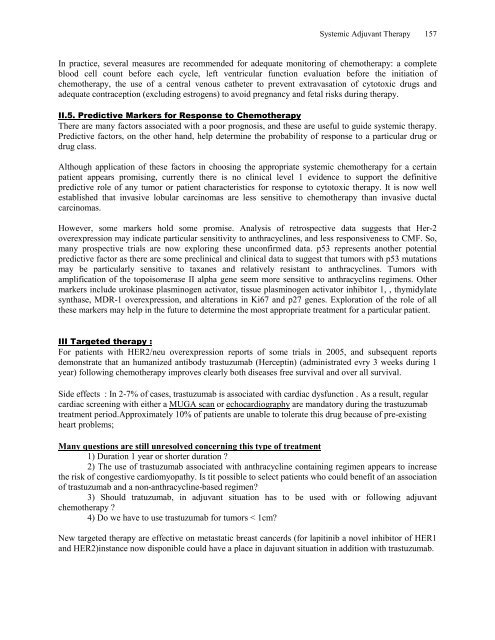Breast Cancer - Arab Medical Association Against Cancer
Breast Cancer - Arab Medical Association Against Cancer
Breast Cancer - Arab Medical Association Against Cancer
- No tags were found...
You also want an ePaper? Increase the reach of your titles
YUMPU automatically turns print PDFs into web optimized ePapers that Google loves.
Systemic Adjuvant Therapy 157In practice, several measures are recommended for adequate monitoring of chemotherapy: a completeblood cell count before each cycle, left ventricular function evaluation before the initiation ofchemotherapy, the use of a central venous catheter to prevent extravasation of cytotoxic drugs andadequate contraception (excluding estrogens) to avoid pregnancy and fetal risks during therapy.II.5. Predictive Markers for Response to ChemotherapyThere are many factors associated with a poor prognosis, and these are useful to guide systemic therapy.Predictive factors, on the other hand, help determine the probability of response to a particular drug ordrug class.Although application of these factors in choosing the appropriate systemic chemotherapy for a certainpatient appears promising, currently there is no clinical level 1 evidence to support the definitivepredictive role of any tumor or patient characteristics for response to cytotoxic therapy. It is now wellestablished that invasive lobular carcinomas are less sensitive to chemotherapy than invasive ductalcarcinomas.However, some markers hold some promise. Analysis of retrospective data suggests that Her-2overexpression may indicate particular sensitivity to anthracyclines, and less responsiveness to CMF. So,many prospective trials are now exploring these unconfirmed data. p53 represents another potentialpredictive factor as there are some preclinical and clinical data to suggest that tumors with p53 mutationsmay be particularly sensitive to taxanes and relatively resistant to anthracyclines. Tumors withamplification of the topoisomerase II alpha gene seem more sensitive to anthracyclins regimens. Othermarkers include urokinase plasminogen activator, tissue plasminogen activator inhibitor 1, , thymidylatesynthase, MDR-1 overexpression, and alterations in Ki67 and p27 genes. Exploration of the role of allthese markers may help in the future to determine the most appropriate treatment for a particular patient.III Targeted therapy :For patients with HER2/neu overexpression reports of some trials in 2005, and subsequent reportsdemonstrate that an humanized antibody trastuzumab (Herceptin) (administrated evry 3 weeks during 1year) following chemotherapy improves clearly both diseases free survival and over all survival.Side effects : In 2-7% of cases, trastuzumab is associated with cardiac dysfunction . As a result, regularcardiac screening with either a MUGA scan or echocardiography are mandatory during the trastuzumabtreatment period.Approximately 10% of patients are unable to tolerate this drug because of pre-existingheart problems;Many questions are still unresolved concerning this type of treatment1) Duration 1 year or shorter duration ?2) The use of trastuzumab associated with anthracycline containing regimen appears to increasethe risk of congestive cardiomyopathy. Is tit possible to select patients who could benefit of an associationof trastuzumab and a non-anthracycline-based regimen?3) Should tratuzumab, in adjuvant situation has to be used with or following adjuvantchemotherapy ?4) Do we have to use trastuzumab for tumors < 1cm?New targeted therapy are effective on metastatic breast cancerds (for lapitinib a novel inhibitor of HER1and HER2)instance now disponible could have a place in dajuvant situation in addition with trastuzumab.









